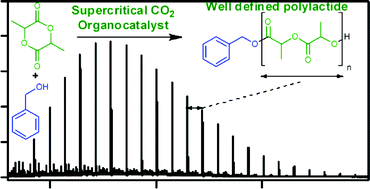Researchers from Australia and the UK have developed a truly ‘green’ process for the synthesis of polylactic acid in the absence of toxic solvents and catalysts.

To read more, click the link below! FREE until 27 July.
Controlled polymerisation of lactide using an organo-catalyst in supercritical carbon dioxide, Idriss Blakey, Anguang Yu, Steven M. Howdle, Andrew K. Whittaker and Kristofer J. Thurecht, Green Chem., 2011, DOI: 10.1039/C1GC15344G
If you liked this, you may also be interested in this article too!
Direct conversion of polyamides to ω-hydroxyalkanoic acid derivatives by using supercritical MeOH, Akio Kamimura, Kouji Kaiso, Shuzo Suzuki, Yusuke Oishi, Yuki Ohara, Tsunemi Sugimoto, Kohichi Kashiwagi and Makoto Yoshimoto, Green Chem., 2011, DOI: 10.1039/C1GC15172J










